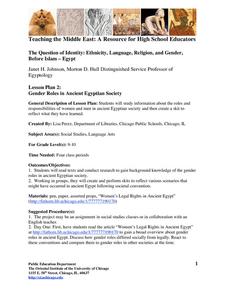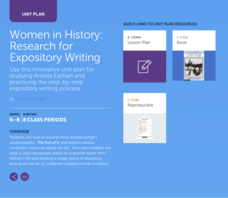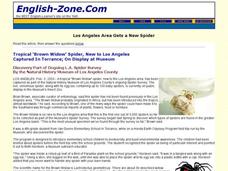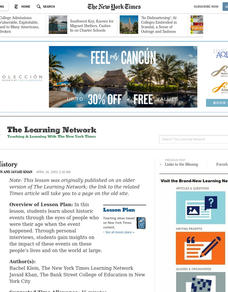Anti-Defamation League
Should Washington's NFL Team Change Their Name?
"What's in a name?" Is it irrelevant, as Juliet suggests in Shakespeare's play, or is nomenclature deeply significant? Young scholars weigh in on the debate by examining the controversy over the NFL's Washington, D.C. Redskins. Groups...
DocsTeach
The Treaty of Guadalupe Hidalgo
The Treaty of Guadalupe Hidalgo ended the Mexican-American War, but it did not end tensions between the two nations. The activity provides learners with an opportunity to practical historical analysis with text experts from the Treaty of...
Smithsonian Institution
Re-Segregation of American Schools: Re-Segregation
Examine the re-segregation of public schools in a thought-provoking resource. Young scholars read articles and primary sources, complete worksheets, and watch a video to explore the idea that desegregation made schools more segregated....
Smithsonian Institution
Resistance to School Desegregation: The Boston Busing Crisis
Despite how it sounds, Boston's busing crisis wasn't a transportation problem. Academics address the problems faced by African Americans following school desegregation and the struggle to receive equal educational opportunities. Scholars...
Lesson Planet
New Books for Black History Month
Suggested books to help students better understand African American history.
Heritage Foundation
The Constitution, Federalism, and the States
The divide between federal and state government is responsible for much of tension that continues to this day, partly because of the US Constitution. The activities in the 14th lesson in a series of 20 are designed to help learners...
Fluence Learning
Writing About Informational Text: Music and the Brain
Even if you've never picked up a musical instrument, chances are that music has directly impacted your mental and emotional development. Sixth graders engage in a reading activity in which they read two articles on the impact of music on...
Curated OER
Readings in Hudson River Natural History
Reading and understanding informational text is a key element to understanding every discipline. Elementary learners read three different articles focused on various animals and habitats in the Hudson River. They answer comprehension...
ProCon
Olympics
Are the Olympic Games a benefit for their host countries and cities? Scholars decide for themselves in preparation for a class debate or discussion. After reading a brief background and overview of the topic, pupils read the top three...
Curated OER
Understanding and Using Primary and Secondary Sources in History
Explore primary and secondary sources in this historical analysis lesson. Young researchers define the terms primary source and secondary source. They read a primary source document provided by the teacher and answer questions about...
Curated OER
Reading Primary Source Documents: Historical Content
Why do we read primary source documents? What can they give us that other writings cannot? Provide your learners with any of the primary sources attached here (there are seven), and have them complete the graphic organizer (which opens...
School District of Detroit
The Articles of the Confederation
Primary historical sources can be a challenge for some readers, so these seven guided-reading questions will be very useful to US History or Government classes studying The Articles of Confederation. Each question has multiple parts and...
DC Vote
One Kid, One Vote
Learn about why the citizens of Washington, D.C. feel unrepresented in Congress with an article about D.C voting rights. Individuals read about the movement toward congressional representation in Washington, D.C., before...
University of Chicago
Gender Roles in Ancient Egyptian Society
After reading about the legal status of women in the Old Kingdom of ancient Egypt and doing some additional research, your young historians will work in groups to develop short skits that reflect a typical gender-role related scenario...
Curated OER
Natural Resources and Ancient Cities
Students explain how the availability of natural resources has affected human settlement patterns. They recognize the interactions of human populations on environments and compare the growth of two ancient cities in relation to natural...
American Press Institute
Newspapers in Your Life: What’s News Where?
Big news isn't necessarily newsworthy everywhere! How do journalists decide what to cover with so much happening around them? A instructional activity on media literacy examines the factors that affect the media's choice of stories to...
Channel Islands Film
Lone Woman of San Nicolas Island: Lesson Plan 3
Should researchers be able to excavate, examine, and remove Native American artifacts from historic sites? Should companies be permitted to build on sacred Native American land? After watching West of the West's documentary, The Lone...
Curated OER
Women in History: Research for Expository Writing
After reading an excerpt from Amelia Earhart's autobiography, The Fun of It, learners explore various nonfiction resources about her life and write a short newspaper article on a specific event. They then develop a longer piece of...
Curated OER
ESL Reading Comprehension: "Brown Widow" Spider
For this ESL reading comprehension worksheet, students read an article about the discovery of the "brown widow" spider and complete a set of 15 comprehension questions.
Curated OER
History of the Americas – Mexican Revolution
In this Mexican history worksheet, students read the noted textbook pages about the Mexican Revolution and then respond to 3 short answer questions.
Curated OER
Florida and it's History
Students read articles on the history of Florida and then answer true and false questions about what they read. In this Florida lesson plan, students are provided worksheets.
Smithsonian Institution
POWs
Why did Vietnam POWs and their families receive more media attention than POWs in previous wars? To answer this question, class members view artifacts, read articles, and engage in class discussion. Individuals then assume the...
Curated OER
Living History
Students investigate historic events through the eyes of people who were their age when the event happened. Through personal interviews, students gain insights on the impact of these events on these people's lives and on the world at large.
Curated OER
Breaking News English: 1989 Freedom Picnic
In this Freedom Picnic activity, students read the article, answer true and false questions, complete synonym matching, complete phrase matching, complete a gap fill, answer short answer questions, answer discussion questions, write, and...























